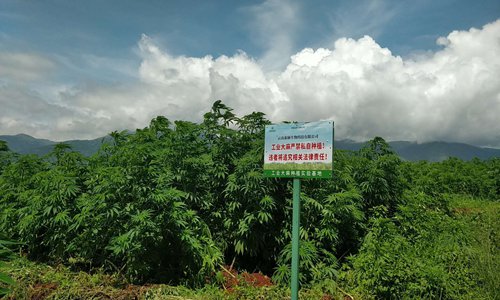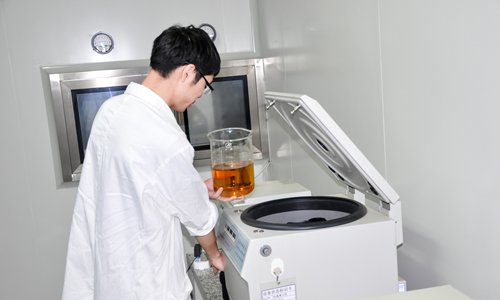HOME >> CHINA
Chinese hemp companies see fortune behind tight controls
By Li Lei Source:Global Times Published: 2019/7/31 18:13:41

A hemp plantation base of the HMI Group in Southwest China's Yunnan Province Photo: Courtesy of HMI Group
Southwest China's Yunnan Province has a long history and tradition of hemp plantation, with its production yield used in rope-making and textiles.
Compared with traditional economic crops, hemp plantations bring more income to local farmers. "The price varies from different varieties. Usually, a kilogram of hemp leaves or flowers can be sold for as much as 15 yuan ($2.2) per kilogram," Tan Xin, chairperson of the Beijing-based Hanma Investment Group (HMI Group), told the Global Times.
The HMI Group is the leading company among the few that are allowed to engage in hemp-related business in China, which is currently planting industrial hemp in Yunnan Province and Northeast China's Heilongjiang Province.
"While [Yunnan's] role as a traditional tobacco planting base fades, industrial hemp has been rising as an important economic plant in Yunnan, and is playing an important role in local economic development," said Tan.
In modern times, hemp is being applied in more areas. Different from medical marijuana, industrial hemp can be used in bandages, diapers and tampons with its natural anti-bacterial, fast-drying and ultraviolet-proof properties, said Tan.
Non-narcotic
A major component of industrial hemp is cannabidiol (CBD), a non-psychoactive compound, and psychoactive constituent tetrahydrocannabinol (THC) content is an important indicator to differentiate narcotic hemp and industrial hemp.
"High THC content means high narcotics content," Zhao Lining, deputy director of a hemp seed cultivation research room of the Chinese Academy of Agricultural science told Yicai, China's financial media. "In the EU and Canada, hemp with THC lower than 0.3 percent is industrial hemp, and THC content higher than 1 percent is narcotic hemp. In China, THC content in hemp is lower than 0.3, which is low- or non-narcotic."
"Industrial hemp is non-narcotic, neither addictive," said Wu Xinghong, head of the Academy of Agricultural Science of Northeast China's Jilin Province.
There are more than 30 countries around the world that allow the plantation of industrial hemp. "CBD tranquilizes and allays excitement and is used for easing epilepsy, Parkinson's disease, Alzheimer's disease, depression and brain tumors," according to China's breaking news website Guanchazhe.
In order to protect traditional economic growth while implementing drug control, in March 2003, Yunnan Province released a provisional regulation on industrial hemp management, making it the first province to authorize hemp plantation in China.
According to statistics, China has the largest area of hemp plantations globally, and has planted more than half of the world's industrial hemp since it approved plantation. Among a global 606 patents involving hemp, China holds 309.
Tan told the Global Times that the HMI Group's products have been applied in cosmetics, skincare products, textile products, food, beverages and biopharming.
China has not officially allowed the application of industrial hemp in food and pharmaceuticals. American and European countries are the major markets for the HMI Group's food and beverage products such as albumen powder and CBD drinks.
"CBD extracted from industrial hemp works well in treating neurodegenerative diseases, and the HMI Group currently has several such medicines under development," Tan told the Global Times.

A scientist from the HMI Group carries a jar of cannabinoid extracted from hemp flowers and leaves. Photo: Courtesy of HMI Group
Strict management
Despite its low psychoactive-substance content, the THC content of industrial hemp has been strictly controlled in many countries to prevent the abuse of marijuana.
"In the actual plantation, seeds of industrial hemp are specially selected to cultivate a variety with low THC, and any company engaging in hemp plantation and processing should get a license and accept strict management from the authority," Hua Zhendong, technical director of China's National Narcotic Control Commission's National Narcotics Laboratory, told the Global Times in a previous report.
Tan told the Global Times on Friday that drug control departments of the public security authority issue licenses after strict investigation.
"Although THC content of industrial hemp is lower than 0.3 percent, a factory is able to extract the matter to make narcotics if it intends to do so, which requires management in accordance with drug control in the industrial hemp production process," Zhao said.
Tan told the Global Times that in order to prevent industrial hemp from falling into illegal usage, production processes at the HMI Group involving raw materials and extraction are under intense surveillance.
"More than 300 surveillance cameras are installed in the production line of hemp leaves and flowers, without any blind angle," said Tan. "Footage of these cameras would be sent to the public security authority."
All staff members are mandated to have their urine tested monthly. During the extraction process, manufacturing shops should be closed to avoid any human contact.
It is not difficult to plant industrial hemp. However, the strict management establishes a rather high threshold for the industry, said Tan.
Newspaper headline: Green gold
RELATED ARTICLES:
Posted in: IN-DEPTH